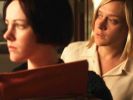Eye For Film >> Movies >> The Wait (2015) Film Review
The Wait
Reviewed by: Jennie Kermode

Saturated with religious imagery and visual touches whose misplaced magnificence threatens to overwhelm its delicate story, Piero Messina's debut feature focuses on two women eking out their mortal days - and building a friendship - whilst waiting for a man who may never arrive. It's set in the run-up to Easter, beneath the beautiful time-bomb that is Etna, between the dark interiors of churches, a lonely mansion, and the rugged black hills. This is a place outside of time, a place where the symbolic dimension moves to the fore, but the film is anchored by two very human performances.
Juliette Binoche is Anna (loosely based on the heroine of Luigi Pirandello's The Life I Gave You), a mother seeking sanctuary in solitude who unexpectedly receives a guest. Lou de Laâge is Jeanne, who introduces herself as the girlfriend of Giuseppe, Anna's son. Giuseppe has told her to go to mansion and wait for him there, so they can spend the Easter festivities together. Despite the misgivings of servant Pietro (Giorgio Colangeli), Anna takes her in, makes her welcome, assures her that she doesn't need to feel awkward or nervous. Over time, they get to know each other. Anna thrives on the younger woman's vivacity and listens to her telephone messages to get an impression of what her life with Giuseppe has been like. Jeanne is pleased to please her and imagines what the future will hold. But Giuseppe isn't answering her calls and, despite Anna's assurances that he will appear on Easter Sunday, she finds feelings of longing impeding her happiness.

Binoche is distant yet gracious as Anna, expressing her complex emotions in subtle ways that Jeanne simply doesn't have the life experience to interpret successfully. Each of them has secrets from the other but she's much better at guarding hers. Each is ultimately deluded, but for Anna it's an active choice. Then again, themes concerning faith and the promises made by Catholicism complicate this notion. Isn't belief rewarding in itself? Cinematographer Francesco Di Giacomo's pseudo-religious imagery may be heavy-handed but it gives the film a magical quality that hints at possibilities quite out of the ordinary.
Messina, who handled the second using on Paolo Sorrentino's The Great Beauty, is aggressively bold in his approach, sometimes evoking Visconti. It doesn't always fit the film but quieter scenes reveal that he does have the capacity for subtle work - perhaps he has just been too anxious to make an impression in this case. Despite his efforts, there is much to recommend the film, especially its beautiful slow shots that give the actresses room to do their thing. It's a contemplative, melancholy work which hints at a semi-religious ecstasy rooted in the mundane and kept just out of reach.
Reviewed on: 11 Apr 2016















